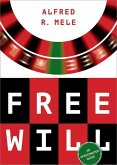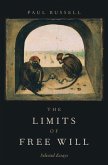Free Will and Theism
Connections, Contingencies, and Concerns
Herausgeber: Timpe, Kevin; Speak, Daniel
Free Will and Theism
Connections, Contingencies, and Concerns
Herausgeber: Timpe, Kevin; Speak, Daniel
- Gebundenes Buch
- Merkliste
- Auf die Merkliste
- Bewerten Bewerten
- Teilen
- Produkt teilen
- Produkterinnerung
- Produkterinnerung
This volume presents a systematic exploration of the relationship between religious beliefs and how they might shape our views about the nature of free will. A team of leading experts in the field focus their attention on this crucial point of intellectual intersection with surprising and illuminating results.
Andere Kunden interessierten sich auch für
![Free Will Free Will]() Thomas Pink (, Lecturer in Philosophy, King's College, University oFree Will17,99 €
Thomas Pink (, Lecturer in Philosophy, King's College, University oFree Will17,99 €![Free Will Free Will]() Alfred R. Mele (William H. and Lucyle T. Werkmeister Professor of PFree Will30,99 €
Alfred R. Mele (William H. and Lucyle T. Werkmeister Professor of PFree Will30,99 €![The Limits of Free Will The Limits of Free Will]() Paul Russell (Professor in Philosophy, Professor in Philosophy, UniThe Limits of Free Will131,99 €
Paul Russell (Professor in Philosophy, Professor in Philosophy, UniThe Limits of Free Will131,99 €![The Bounds of Possibility The Bounds of Possibility]() Prof Cian Dorr (Professor of Philosophy, Professor of Philosophy, NThe Bounds of Possibility32,99 €
Prof Cian Dorr (Professor of Philosophy, Professor of Philosophy, NThe Bounds of Possibility32,99 €![Oxford Studies in Agency and Responsibility Oxford Studies in Agency and Responsibility]() Oxford Studies in Agency and Responsibility52,99 €
Oxford Studies in Agency and Responsibility52,99 €![Free Will Free Will]() Free Will34,99 €
Free Will34,99 €![Mind, Quantum, and Free Will Mind, Quantum, and Free Will]() Peter EllsMind, Quantum, and Free Will25,99 €
Peter EllsMind, Quantum, and Free Will25,99 €-
-
-
This volume presents a systematic exploration of the relationship between religious beliefs and how they might shape our views about the nature of free will. A team of leading experts in the field focus their attention on this crucial point of intellectual intersection with surprising and illuminating results.
Hinweis: Dieser Artikel kann nur an eine deutsche Lieferadresse ausgeliefert werden.
Hinweis: Dieser Artikel kann nur an eine deutsche Lieferadresse ausgeliefert werden.
Produktdetails
- Produktdetails
- Verlag: Oxford University Press
- Seitenzahl: 330
- Erscheinungstermin: 5. Juli 2016
- Englisch
- Abmessung: 241mm x 159mm x 27mm
- Gewicht: 626g
- ISBN-13: 9780198743958
- ISBN-10: 0198743955
- Artikelnr.: 47864860
- Herstellerkennzeichnung
- Libri GmbH
- Europaallee 1
- 36244 Bad Hersfeld
- gpsr@libri.de
- Verlag: Oxford University Press
- Seitenzahl: 330
- Erscheinungstermin: 5. Juli 2016
- Englisch
- Abmessung: 241mm x 159mm x 27mm
- Gewicht: 626g
- ISBN-13: 9780198743958
- ISBN-10: 0198743955
- Artikelnr.: 47864860
- Herstellerkennzeichnung
- Libri GmbH
- Europaallee 1
- 36244 Bad Hersfeld
- gpsr@libri.de
Kevin Timpe is William Harry Jellema Chair in Christian Philosophy at Calvin College, and a former Templeton Research Fellow at St. Peter's College, Oxford University. His research is focused on the metaphysics of free will and moral responsibility, virtue ethics, philosophy of disability, and issues in the philosophy of religion. He is the author of Free Will: Sourcehood and its Alternatives, 2nd edn (Bloomsbury, 2012) and Free Will in Philosophical Theology (Bloomsbury, 2013). He has edited a number of volumes, including Virtues and Their Vices (OUP, 2014) and Arguing about Religion (Routledge, 2009). He is currently working (with Meghan Griffith and Neil Levy) on The Routledge Companion to Free Will. Daniel Speak is Associate Professor of Philosophy at Loyola Marymount University. He has recently served as a Visiting Research Fellow at Biola University's Center for Christian Thought and as a Senior Fellow at the Center for Philosophy of Religion at Rutgers University. He thinks and writes principally about the metaphysics, ethics, and epistemology of free will and about related issues in the philosophy of religion. His articles have appeared in The Philosophical Quarterly, Faith and Philosophy, and The Oxford Handbook of Free Will, among others.
* Introduction
* 1: Manuel R. Vargas: The runeburg problem: theism, libertarianism,
and motivated reasoning
* 2: John Martin Fischer: Libertarianism and the problem of
flip-flopping
* 3: Laura W. Ekstrom: The cost of freedom
* 4: Jerry L. Walls: One hell of a problem for christian compatibilists
* 5: Tamler Sommers: Relative responsibility and theism
* 6: Derk Pereboom: Libertarianism and theological determinism
* 7: Timothy O'Connor: Against theological determinism
* 8: T. J. Mawson: Theism has no implications for the debate between
libertarianism and compatibilism
* 9: Helen Steward: Libertarianism as a naturalistic position
* 10: Meghan Griffith: Agent causation and theism
* 11: Michael J. Almeida: Bringing about perfect worlds
* 12: W. Matthews Grant: Divine universal causality and libertarian
freedom
* 13: Neal Judisch: Divine conservation and creaturely freedom
* 14: Rebekah L. H. Rice: Divine agency and acting for reasons
* 15: Kevin Timpe: God's freedom, God's character
* 16: Jesse Couenhoven: Immutable freedom
* 1: Manuel R. Vargas: The runeburg problem: theism, libertarianism,
and motivated reasoning
* 2: John Martin Fischer: Libertarianism and the problem of
flip-flopping
* 3: Laura W. Ekstrom: The cost of freedom
* 4: Jerry L. Walls: One hell of a problem for christian compatibilists
* 5: Tamler Sommers: Relative responsibility and theism
* 6: Derk Pereboom: Libertarianism and theological determinism
* 7: Timothy O'Connor: Against theological determinism
* 8: T. J. Mawson: Theism has no implications for the debate between
libertarianism and compatibilism
* 9: Helen Steward: Libertarianism as a naturalistic position
* 10: Meghan Griffith: Agent causation and theism
* 11: Michael J. Almeida: Bringing about perfect worlds
* 12: W. Matthews Grant: Divine universal causality and libertarian
freedom
* 13: Neal Judisch: Divine conservation and creaturely freedom
* 14: Rebekah L. H. Rice: Divine agency and acting for reasons
* 15: Kevin Timpe: God's freedom, God's character
* 16: Jesse Couenhoven: Immutable freedom
* Introduction
* 1: Manuel R. Vargas: The runeburg problem: theism, libertarianism,
and motivated reasoning
* 2: John Martin Fischer: Libertarianism and the problem of
flip-flopping
* 3: Laura W. Ekstrom: The cost of freedom
* 4: Jerry L. Walls: One hell of a problem for christian compatibilists
* 5: Tamler Sommers: Relative responsibility and theism
* 6: Derk Pereboom: Libertarianism and theological determinism
* 7: Timothy O'Connor: Against theological determinism
* 8: T. J. Mawson: Theism has no implications for the debate between
libertarianism and compatibilism
* 9: Helen Steward: Libertarianism as a naturalistic position
* 10: Meghan Griffith: Agent causation and theism
* 11: Michael J. Almeida: Bringing about perfect worlds
* 12: W. Matthews Grant: Divine universal causality and libertarian
freedom
* 13: Neal Judisch: Divine conservation and creaturely freedom
* 14: Rebekah L. H. Rice: Divine agency and acting for reasons
* 15: Kevin Timpe: God's freedom, God's character
* 16: Jesse Couenhoven: Immutable freedom
* 1: Manuel R. Vargas: The runeburg problem: theism, libertarianism,
and motivated reasoning
* 2: John Martin Fischer: Libertarianism and the problem of
flip-flopping
* 3: Laura W. Ekstrom: The cost of freedom
* 4: Jerry L. Walls: One hell of a problem for christian compatibilists
* 5: Tamler Sommers: Relative responsibility and theism
* 6: Derk Pereboom: Libertarianism and theological determinism
* 7: Timothy O'Connor: Against theological determinism
* 8: T. J. Mawson: Theism has no implications for the debate between
libertarianism and compatibilism
* 9: Helen Steward: Libertarianism as a naturalistic position
* 10: Meghan Griffith: Agent causation and theism
* 11: Michael J. Almeida: Bringing about perfect worlds
* 12: W. Matthews Grant: Divine universal causality and libertarian
freedom
* 13: Neal Judisch: Divine conservation and creaturely freedom
* 14: Rebekah L. H. Rice: Divine agency and acting for reasons
* 15: Kevin Timpe: God's freedom, God's character
* 16: Jesse Couenhoven: Immutable freedom








